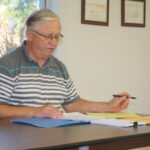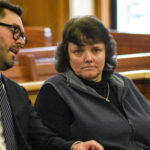CARIBOU, Maine — Teachers and principals of RSU 39 will be evaluated through a new set of criteria come the fall, and early participants with the new guidelines are pleased with the results.
“The big idea, and the new idea for us, is how do we actually measure ‘are our students getting smarter in our classrooms?’” explained Assistant Superintendent Lois Brewer. “We want it to be an idea that teachers can embrace and feel good about, not frightened or threatened.”
Principal of Hilltop Elementary Jane McCall told the RSU 39 board, during their Jan. 29 meeting, that she likes the new evaluation plan and found it to be a good learning experience.
“It’s beneficial in the way that at the end of the conversation, I walked away knowing there were some areas that I can grow and improve — as we all can,” McCall noted.
Every year, teachers and principals are evaluated on how well they’ve educated their students. Effective as of late June, school districts will have to comply with the new Chapter 180 Performance Evaluation and Professional Growth Systems adopted by the state legislature.
According to its summary, Chapter 180 establishes standards and procedures for implementation of performance evaluation and professional growth systems for educators.
Brewer outlined Chapter 180 for the school board, explaining that the new rule sets forth the process for obtaining Department of Education approval of locally developed plans for evaluating teachers and principals.
Developing the RSU’s evaluation plan was a steering committee of 14 teachers and 10 administrators that spans all grades and schools. The steering committee decided to utilize rubrics developed by renowned educational researcher Dr. Robert Marzano for teacher/principal evaluations.
Brewer briefly outlined what Dr. Marzano has written books detailing: there are 41 elements of instructural practice that — when done well and appropriately by a trained, professional educator — have a high correlation with increased student achievement.
“It’s not a cookbook type of a thing — you have to be very thoughtful about your practice,” she clarified, adding that while the guidelines include some great aspects, the evaluation standards are pretty high.
“We have confidence that our teachers, when they look at all these elements, they’re going to find some areas they can grow in — there are teachers on our team who found things they can grow on,” the assistant superintendent added.
Katie McGough teaches fifth grade at the Limestone Community School and is one of the 14 teachers of the steering committee; she feels teachers will like the fact that the new evaluation standards provide a structured rubric on how they’re going to be evaluated.
“Like in every profession, we want to do a good job,” McGough explained. “We do this profession because we care about our kids and want to grow to become better educators — but sometimes it’s a question of ‘how exactly do I do this’ or ‘what exactly do you want me to be doing.’”
To answer those questions, the new evaluation guidelines have a checklist and detailed specifics of exactly what teachers need to be doing to ensure the success of their students.
School Board member Ronald Willey, a life-long educator, thanked the steering committee for innumerable hours spent creating these educational standards; he also expressed concern that teachers’ evaluation records will include data from students with attendance as low as 80 percent — equal to a student missing a day of school every week.
Brewer explained that if a teacher feels that they haven’t had enough time with a student to impact his or her achievement, the teacher would be able to request to their administrator that a student be removed from the teacher goals, as outlined in the new evaluation criteria that requires teachers to set goals and provide evidence of improvement
“In our previous evaluation system that we had for administrators, I didn’t gather as much feedback on how to improve and what my areas of weakness were,” described Hilltop’s principal, McCall.
McGough said that the new criteria has afforded her opportunities to improve the education she’s providing her students; she’d utilized learning targets, for example, in her nearly decade-long career in education — but never with as much success that she’s seen using the new Marzano rubrics. Her students even understand learning targets better, and are able to gauge themselves on how they’re doing with certain subjects.
“I’ve taken something that I was doing at a fairly basic level and already, in half a year, I’ve really done so much with it,” she said.







